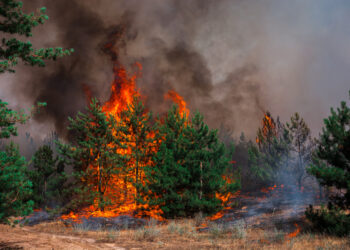By Evelyn Boswell MSU News Service
BOZEMAN – A Montana State University scientist who studies wildfires around the world now has a Fulbright scholar grant to research fires in central Chile. Dave McWethy will use his grant both to conduct research and teach at the University of Concepcion, in Chile’s second largest city.
“It’s an important time to look at wildfires,” said McWethy, assistant research professor in MSU’s Department of Earth Sciences in the College of Letters and Science. “There have been some really large fires happening right now that are threatening communities and rare forests throughout central Chile.”
McWethy and his family will move to Chile in December, and he’ll start his fieldwork in January, focusing on Araucaria araucana forests and wildfires.
Araucaria araucana forests grew all over the prehistoric world, but they’re becoming increasingly rare, McWethy said. The tree now grows in the central region of Chile, as well as parts of Argentina, Australia and New Zealand, but it’s listed as endangered. Commonly called a monkey puzzle tree, it’s considered a living fossil.
Large fires swept through the forests in 2002, and fires in the first few months of 2015 have burned more than 10,000 acres near Valparaíso and Santiago, destroying thousands of homes and forcing more than 10,000 people to evacuate, McWethy said.
On March 1, the beginning of the university’s fall semester, he’ll start teaching a seminar on global fire ecology and a field course on reconstructing historical conditions. His Fulbright ends June 30.
Scientists think fire activity is increasing because non-native, more flammable shrubs and tree plantations are replacing native vegetation that is more fire resistant.
All these non-native shrubs are highly flammable, McWethy said. This combination of flammable vegetation and warm, dry summers promotes fires that threaten communities and the few remaining Araucaria forests.
Scientists are just beginning to understand how changes in plant communities are influencing fire activity. McWethy said his Fulbright will allow him and his Chilean collaborators to build on previous research to better understand why fire activity is increasing throughout central Chile. They will examine factors responsible for the recent trends and develop maps that identify where the fire risk is greatest.
When his Fulbright ends, McWethy said he hopes that he and his collaborators can build on their work with funding from the National Geographic Society and the National Science Foundation.
“I think the mission of the Fulbright program, to facilitate international partnership and exchange, is really important for both countries, and it will help U.S. and Chilean scientists stay competitive,” McWethy said. “I’m really excited to work with Chilean researchers and students.”
The Fulbright Program is the flagship international educational exchange program sponsored by the U.S. government. Its primary source of funding is an annual appropriation made by Congress to the U.S. Department of State, Bureau of Educational and Cultural Affairs.












